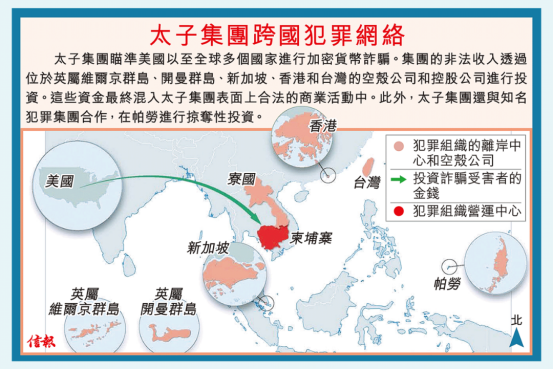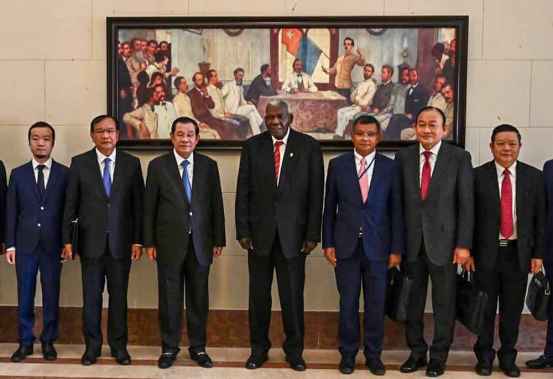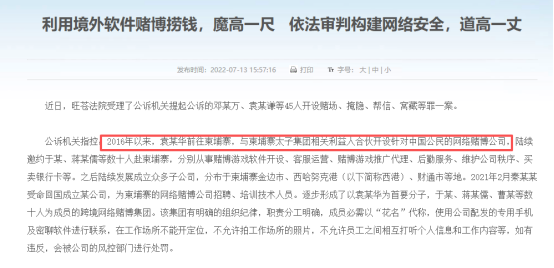Written by: Tuo Luo Finance
The notorious telecom fraud gangs are universally condemned, yet despite this, they continue to thrive due to their exceptional disguise and concealment. It remains difficult to eradicate them completely, and they occasionally manage to leverage local political and business resources, becoming a "darkness under the lamp" hidden within the entanglements of power and commerce.
Recently, law enforcement from the UK and the US jointly seized the largest amount of telecom fraud funds in US history. The Eastern District of New York Federal Court (EDNY) announced that the Department of Justice confiscated 127,000 bitcoins during an enforcement action against the Cambodian Prince Group. At current prices, this amount is close to $15 billion, which translates to over 106.9 billion yuan.
The joint efforts of the UK and the US successfully struck a blow against the "pig-butchering" empire in Southeast Asia, and behind this operation, there are Chinese individuals involved.
On October 15, Beijing time, the US Department of Justice announced that it would formally initiate criminal charges against Chen Zhi, the founder of the Cambodian Prince Group, for "telecom fraud and money laundering." Prior to this, the US Treasury confirmed that it had conducted a joint operation with the UK Foreign Office to crack down on transnational crime networks in Southeast Asia, imposing large-scale sanctions on 146 targets within the Prince Group. The UK also took strong action, sanctioning six involved companies and six criminal suspects in the Southeast Asian region.
According to foreign media reports, the criminal activities of the Prince Group are appalling. They have established at least ten telecom fraud parks within Cambodia and are suspected of human trafficking and forced labor, with even murder allegations. The group lured foreign nationals, primarily Chinese, to the local area by posting fake job advertisements in over 60 countries worldwide, using violent means to control them, restricting their personal freedom, and forcing them to engage in telecom fraud. The Prince Group even implemented a "do not kill" standard for their overseers. According to revelations from US prosecutors, the control methods of the Prince Group are extremely brutal, including physical abuse, isolation, movement restrictions, arbitrary fines and fees, threats of sexual exploitation, and confiscation of personal documents and electronic devices.

In this context, a global telecom fraud network rapidly expanded, with the Prince Group becoming one of the largest transnational criminal organizations in Southeast Asia. The two main fraud centers under the group are equipped with 1,250 mobile phones and control 76,000 social media accounts. In terms of methods, this group is no different from traditional telecom fraud; members contact victims through social media, establish emotional connections, and then induce them to transfer money under the pretext of investment or other reasons. The funds obtained through fraud are laundered via cryptocurrencies or through various shell companies, ultimately being split into smaller amounts to bypass regulations before being deposited into cryptocurrency wallets or bank accounts.
Through these means, the group has amassed illegal profits exceeding $10 billion. The founder once boasted that the "pig-butchering" operation earned $30 million a day, and according to insiders, the total amount involved in the case may exceed $100 billion.
Some may wonder how such a large telecom fraud group, operating for years in Cambodia, went unnoticed. This brings us to the special relationship between the Prince Group and local political factions.
The Prince Group is not unfamiliar to Cambodia; it is one of the top ten conglomerates in the country. Its business scope includes high-end real estate development, star-rated hotel and resort operations, and banking and finance, with operations in over 30 countries, creating more than 3,500 jobs. Iconic projects in Cambodia, such as the Prince Building in Phnom Penh and the "Cloud City" resort development project, are associated with the Prince Group. At its peak, locals even claimed that over 30% of the Rolls-Royce cars on Cambodian roads belonged to the Prince Group.
Behind this vast criminal empire is a Chinese individual from Fujian—Chen Zhi. Born in 1988, Chen is now 37 years old and hails from Lianjiang, Fujian. It is said that Chen was involved in smuggling gaming machines and running internet cafes in China before moving to Cambodia in 2009. Upon arriving in Cambodia, this previously unknown young man quickly rose to the pinnacle of his life.
Looking back at Chen Zhi's timeline of wealth accumulation, it can only be described as bizarre. In 2011, Chen established a real estate company in Cambodia, officially entering the real estate industry. In February 2014, he became a Cambodian citizen, and in 2015, he officially founded the Prince Group. Mysteriously, there is no information available online about how Chen made his first fortune, except for a disclosure from the Cayman National Bank that he received a personal loan of $2 million from his uncle in 2011, suggesting that Chen emerged in the real estate sector seemingly out of nowhere. By 2017, Chen had become an advisor to the Cambodian Ministry of Interior, holding a position equivalent to that of a deputy secretary of state. In the same year, he collaborated with Shao Ken (the son of the then Minister of Interior, who later succeeded him) to establish the gambling group Jinbei Investment Co., Ltd. Notably, this company has a notorious history, having been officially named in fraud cases, and in 2023, it was even linked to a murder case involving the brutal killing of a 25-year-old Chinese citizen. It can be speculated that Chen Zhi's family influence is significant, allowing him to quickly integrate into Cambodia's political and business environment.
While the son of the Minister of Interior certainly carries weight, Chen Zhi's true benefactor is none other than former Cambodian Prime Minister Hun Sen. The relationship between Chen Zhi and the Hun Sen family is even more enigmatic. The public information indicates that in 2018, Chen donated $3 million to the Hun Sen Foundation, after which he became a frequent guest at the Prime Minister's residence. The two often attended events together, and it was from 2018 that Chen's Prince Group officially took off. The Prince Group suddenly invested heavily in acquiring multiple plots of land in Sihanoukville, obtaining licenses for banking, gambling, and other ventures, leading to the development of numerous resort hotels. With the gambling boom in Sihanoukville, projects such as Prince Modern Plaza, Prince Club, Prince Hotel, and Sihanoukville Tak Island were successively completed, rapidly expanding Chen Zhi's wealth, with his publicly declared personal assets growing to $8.5 billion, placing him on the Hurun Global Rich List. Beneath the towering skyscrapers lies a vast telecom fraud network, which is truly alarming.
By 2020, the real estate foundation of the Prince Group was essentially established, and Chen Zhi's political influence in Cambodia accelerated. In the same year, he was granted the title of Duke in Cambodia and served as a personal advisor to Hun Sen, former National Assembly President Heng Samrin, and former Minister of Interior Shao Ken. In 2022, Chen attended the Cuban National Assembly with Hun Sen and even represented the Cambodian government in providing aid to neighboring Laos. By 2024, he was directly appointed by King Norodom Sihamoni as an advisor to Prince Hun Sen, continuously moving from the political periphery to the center.

Chen Zhi (far left) and Hun Sen (third from left) participating in political activities
With power and money advancing hand in hand, collusion between officials and businessmen is inevitable. The indictment mentions that the Prince Group has a ledger for "bribing public officials." On Hun Sen's birthday, it was reported that Chen Zhi once rented the entire Phnom Penh Exhibition Center for a banquet, extravagantly arranging a fleet of Rolls-Royce cars adorned with gold foil for the celebration, creating quite a spectacle.
Under this protection, the Prince Group has thrived, deeply embedding itself in Cambodia's economy and becoming one of the major conglomerates in the region. In fact, while wielding power in Cambodia, the Prince Group has been named multiple times in China. As early as 2020, media reported that the Beijing Public Security Bureau was investigating whether the Prince Group was involved in cross-border gambling and illegal money laundering. By 2022, the Wanzhang Court in Sichuan Province exposed a gambling case that mentioned individuals involved traveling to Cambodia to partner with those connected to the Prince Group to establish an online gambling company targeting Chinese citizens.

Of course, the Prince Group has denied these allegations, claiming they are the result of criminals misusing its name. Looking at the current situation, these accusations are evidently true, and Chen Zhi and the Prince Group's ability to evade capture likely stems from the protection of the Cambodian authorities. After all, crimes occurring right under their noses have gone unnoticed and allowed the group to grow so large, clearly forming a massive political and business interest group. Ironically, last year, Cambodia's newly appointed Prime Minister Hun Manet vowed to "further strengthen cooperation in law enforcement between China and Cambodia, especially in combating cross-border gambling, drug trafficking, human trafficking, cybercrime, and fake news."
On the other hand, although Chen Zhi presents a low profile in the media, his lifestyle is undoubtedly extravagant. It is reported that Chen has acquired properties in multiple locations, including a $114 million office building in central London and 17 apartments. He also purchased a private estate in Sihanoukville and has a penchant for keeping exotic animals as pets. In addition to his luxurious mansions, he possesses a wide array of luxury goods and art collections, even spending $24 million on the luxury yacht Nonni II to enjoy life. Notably, in September 2025, Chen Zhi reportedly made headlines in the cryptocurrency market by selling 24,000 bitcoins.
The most despicable aspect is that, while spending money stained with blood, Chen Zhi also seeks to create a "charitable" persona. It is reported that he established the "Chen Zhi Scholarship," investing $2 million over seven years to support 400 Cambodian university students, set up the "Prince Watch Vocational Training Center" to cultivate watchmaking talent in Cambodia, and has funded the Cambodian national team and cultural heritage rescue efforts. Since 2021, the Prince Group has won the "Best National Excellence in Cambodia" award for four consecutive years, and the royal family has even bestowed upon Chen the honorary title of "Neak Oknha." One can only say that Chen Zhi has indeed contributed to Cambodia, but behind that contribution lies a trail of shattered families.
The law's net is vast and does not let anything slip through. Now, the recent joint law enforcement by the UK and the US has exposed the hidden interest groups to the surface. Currently, the US Treasury has imposed sanctions on 145 targets associated with the Prince Group, including three Taiwanese women—Huang Chieh, Shih Ting-yu, and Wang Michelle Reishane—as well as companies like Lianfan, Lianfan Er, Ruidu, Boju, Boju Er, Chengshuo, Maiyu, Mingwan, and Taiwan Prince Real Estate Investment, freezing all assets and property rights of the relevant individuals within the US or held or controlled by US persons. Further information indicates that senior members of the Prince Group hail from Chongqing, Hong Kong, and Taiwan, as well as Singapore, the UK, Cambodia, Palau, and other countries, most of whom are of Chinese descent.
According to the current charges from the US Department of Justice, Chen Zhi faces a potential sentence of up to 40 years. Regrettably, as of now, Chen Zhi is still at large. According to passport information, Chen holds Cambodian citizenship, has also acquired British citizenship, and obtained citizenship from Vanuatu and Cyprus. However, given the current situation, whether as a warning to others or for the sake of interests, the UK and the US will vigorously pursue Chen Zhi, and his capture is merely a matter of time.
Ten years have passed, and such a large and inhumane fraud group has finally been dismantled. However, it is lamentable that this joint law enforcement by the UK and the US was prompted by the involvement of their own citizens as victims. If it were not for the UK and US fraud chain, would the telecom fraud gang led by Chen Zhi have been apprehended, or would they have continued to exploit the hard-earned money of ordinary people under the protection of interest groups? This question ultimately remains unanswered.
免责声明:本文章仅代表作者个人观点,不代表本平台的立场和观点。本文章仅供信息分享,不构成对任何人的任何投资建议。用户与作者之间的任何争议,与本平台无关。如网页中刊载的文章或图片涉及侵权,请提供相关的权利证明和身份证明发送邮件到support@aicoin.com,本平台相关工作人员将会进行核查。




